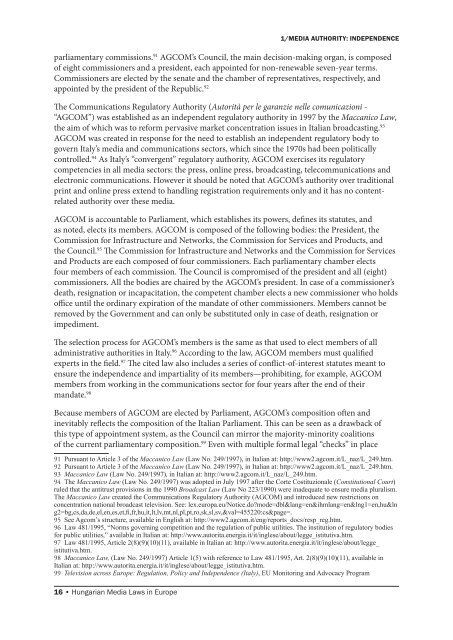An Assessment of the Consistency of Hungary's Media Laws with ...
An Assessment of the Consistency of Hungary's Media Laws with ...
An Assessment of the Consistency of Hungary's Media Laws with ...
You also want an ePaper? Increase the reach of your titles
YUMPU automatically turns print PDFs into web optimized ePapers that Google loves.
16 • Hungarian <strong>Media</strong> <strong>Laws</strong> in Europe<br />
1/<strong>Media</strong> authority: independence<br />
parliamentary commissions. 91 AGCOM’s Council, <strong>the</strong> main decision-making organ, is composed<br />
<strong>of</strong> eight commissioners and a president, each appointed for non-renewable seven-year terms.<br />
Commissioners are elected by <strong>the</strong> senate and <strong>the</strong> chamber <strong>of</strong> representatives, respectively, and<br />
appointed by <strong>the</strong> president <strong>of</strong> <strong>the</strong> Republic. 92<br />
The Communications Regulatory Authority (Autorità per le garanzie nelle comunicazioni -<br />
“AGCOM”) was established as an independent regulatory authority in 1997 by <strong>the</strong> Maccanico Law,<br />
<strong>the</strong> aim <strong>of</strong> which was to reform pervasive market concentration issues in Italian broadcasting. 93<br />
AGCOM was created in response for <strong>the</strong> need to establish an independent regulatory body to<br />
govern Italy’s media and communications sectors, which since <strong>the</strong> 1970s had been politically<br />
controlled. 94 As Italy’s “convergent” regulatory authority, AGCOM exercises its regulatory<br />
competencies in all media sectors: <strong>the</strong> press, online press, broadcasting, telecommunications and<br />
electronic communications. However it should be noted that AGCOM’s authority over traditional<br />
print and online press extend to handling registration requirements only and it has no contentrelated<br />
authority over <strong>the</strong>se media.<br />
AGCOM is accountable to Parliament, which establishes its powers, defines its statutes, and<br />
as noted, elects its members. AGCOM is composed <strong>of</strong> <strong>the</strong> following bodies: <strong>the</strong> President, <strong>the</strong><br />
Commission for Infrastructure and Networks, <strong>the</strong> Commission for Services and Products, and<br />
<strong>the</strong> Council. 95 The Commission for Infrastructure and Networks and <strong>the</strong> Commission for Services<br />
and Products are each composed <strong>of</strong> four commissioners. Each parliamentary chamber elects<br />
four members <strong>of</strong> each commission. The Council is compromised <strong>of</strong> <strong>the</strong> president and all (eight)<br />
commissioners. All <strong>the</strong> bodies are chaired by <strong>the</strong> AGCOM’s president. In case <strong>of</strong> a commissioner’s<br />
death, resignation or incapacitation, <strong>the</strong> competent chamber elects a new commissioner who holds<br />
<strong>of</strong>fice until <strong>the</strong> ordinary expiration <strong>of</strong> <strong>the</strong> mandate <strong>of</strong> o<strong>the</strong>r commissioners. Members cannot be<br />
removed by <strong>the</strong> Government and can only be substituted only in case <strong>of</strong> death, resignation or<br />
impediment.<br />
The selection process for AGCOM’s members is <strong>the</strong> same as that used to elect members <strong>of</strong> all<br />
administrative authorities in Italy. 96 According to <strong>the</strong> law, AGCOM members must qualified<br />
experts in <strong>the</strong> field. 97 The cited law also includes a series <strong>of</strong> conflict-<strong>of</strong>-interest statutes meant to<br />
ensure <strong>the</strong> independence and impartiality <strong>of</strong> its members—prohibiting, for example, AGCOM<br />
members from working in <strong>the</strong> communications sector for four years after <strong>the</strong> end <strong>of</strong> <strong>the</strong>ir<br />
mandate. 98<br />
Because members <strong>of</strong> AGCOM are elected by Parliament, AGCOM’s composition <strong>of</strong>ten and<br />
inevitably reflects <strong>the</strong> composition <strong>of</strong> <strong>the</strong> Italian Parliament. This can be seen as a drawback <strong>of</strong><br />
this type <strong>of</strong> appointment system, as <strong>the</strong> Council can mirror <strong>the</strong> majority-minority coalitions<br />
<strong>of</strong> <strong>the</strong> current parliamentary composition. 99 Even <strong>with</strong> multiple formal legal “checks” in place<br />
91 Pursuant to Article 3 <strong>of</strong> <strong>the</strong> Maccanico Law (Law No. 249/1997), in Italian at: http://www2.agcom.it/L_naz/L_249.htm.<br />
92 Pursuant to Article 3 <strong>of</strong> <strong>the</strong> Maccanico Law (Law No. 249/1997), in Italian at: http://www2.agcom.it/L_naz/L_249.htm.<br />
93 Maccanico Law (Law No. 249/1997), in Italian at: http://www2.agcom.it/L_naz/L_249.htm.<br />
94 The Maccanico Law (Law No. 249/1997) was adopted in July 1997 after <strong>the</strong> Corte Costituzionale (Constitutional Court)<br />
ruled that <strong>the</strong> antitrust provisions in <strong>the</strong> 1990 Broadcast Law (Law No 223/1990) were inadequate to ensure media pluralism.<br />
The Maccanico Law created <strong>the</strong> Communications Regulatory Authority (AGCOM) and introduced new restrictions on<br />
concentration national broadcast television. See: lex.europa.eu/Notice.do?mode=dbl&lang=en&ihmlang=en&lng1=en,hu&ln<br />
g2=bg,cs,da,de,el,en,es,et,fi,fr,hu,it,lt,lv,mt,nl,pl,pt,ro,sk,sl,sv,&val=455220:cs&page=.<br />
95 See Agcom’s structure, available in English at: http://www2.agcom.it/eng/reports_docs/resp_reg.htm.<br />
96 Law 481/1995, “Norms governing competition and <strong>the</strong> regulation <strong>of</strong> public utilities. The institution <strong>of</strong> regulatory bodies<br />
for public utilities,” available in Italian at: http://www.autorita.energia.it/it/inglese/about/legge_istitutiva.htm.<br />
97 Law 481/1995, Article 2(8)(9)(10)(11), available in Italian at: http://www.autorita.energia.it/it/inglese/about/legge_<br />
istitutiva.htm.<br />
98 Maccanico Law, (Law No. 249/1997) Article 1(5) <strong>with</strong> reference to Law 481/1995, Art. 2(8)(9)(10)(11), available in<br />
Italian at: http://www.autorita.energia.it/it/inglese/about/legge_istitutiva.htm.<br />
99 Television across Europe: Regulation, Policy and Independence (Italy), EU Monitoring and Advocacy Program

















